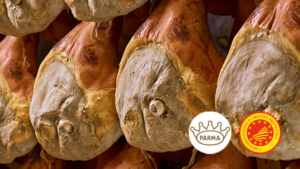
The Parma Ham Consortium confirms its commitment to the environment and completes a multi-year project aimed at supporting the ecological transition of its companies.
Launched in 2022 , the project aimed to define an environmental policy for the Prosciutto di Parma PDO sector that is at the service of its producers, optimising their sustainability performance.
To do this, the Parma DOP protection body involved highly qualified and authoritative partners: the Polytechnic University of Milan for the definition and implementation phase of the project, its spin-off Enersem for the development of the software envisaged by the research and CSQA for the aspects relating to the checks .
The project, over the course of more than two years, involved the implementation of several distinct phases. Initially, the environmental footprint of the Prosciutto di Parma DOP sector was calculated by applying the official PEF (Product Environmental Footprint) methodology , a tool made available by the European Commission to evaluate, through specific indicators, the environmental impact of production activities. This operation was made possible thanks to the involvement and active participation of a large number of companies in the sector and was subsequently validated by the CSQA Certification Body .
In light of the data processed and collected in this first phase, the Consortium was able to deposit with the Ministry of the Environment and Energy Security (MASE) the so-called Product Category Rules (RCP) valid for all DOP raw hams, which define a reference environmental profile for this product category. This step was necessary to request the activation, for Prosciutto di Parma DOP, of the Made Green in Italy scheme , the national certification scheme on the environmental footprint of the product promoted by MASE , which was created to recognize, upon voluntary request by companies, Made in Italy products of high environmental quality.
In the last phase , a software for calculating and reducing the environmental footprint was created and made available to companies in the Prosciutto di Parma DOP sector , aimed at optimising the performance of the entire production cycle. Through this software, also verified by CSQA, producers who request it receive personalised improvement suggestions for reducing the environmental footprint of the product and for energy saving, in addition to a report on their environmental performance and a comparison with comparable companies.
"The value of a unique product like Prosciutto di Parma DOP is also measured by its ability to show itself consistent with the needs of consumers and with the challenges of a rapidly changing world. The indissoluble bond that our DOP has with its territory makes us even more responsible with respect to the impact generated by our productions, which is why we are particularly proud to have conducted this project together with the Politecnico di Milano, Enersem and CSQA. The main objective was to support our companies in their already significant commitment to the ecological transition, thus strengthening environmental protection, for the future of the sector and for new generations. What we note with deep satisfaction is that a significant number of producers have already decided to make use of the software we have created with this project, confirming the environmental ethics of our sector, also to the benefit of its competitiveness on foreign markets in relation to these important issues", comments Alessandro Utini, President of the Consorzio del Prosciutto di Parma.
“The collaboration with the Parma Ham Consortium for the realization of this research has proven to be extremely significant. Projects of this nature, promoted by Consortia and sector organizations, are essential to accelerate the ecological transition envisaged by the European Green Deal. Relating to the needs of the productive world allows the Politecnico di Milano to explore new research paths and respond to the need for continuous innovation. Collaboration with the industrial world also allows us to support the vocation of the territories and to be a stimulus for their development also and above all in terms of sustainability. We hope that this initiative can inspire other Consortia, promoting concrete actions to achieve the ambitious and essential decarbonization objectives”, commented Mauro Ceconello and Carlo Proserpio from the Politecnico di Milano , coordinators of the project.
Matteo Zanchi, General Manager of Enersem , joins in: “We are particularly satisfied with the software created, the first ever designed for PDOs and developed specifically for Parma Ham. All companies in the sector now have a simpler path to obtain environmental certification, thanks to: simplicity and speed with which companies can provide data and information on environmental performance; union of PEF calculation and proposal of interventions to reduce it; consistent and comparable analyses among all producers; a solid methodology and a series of rigorous and precise models”.
"The EU legislation on environmental declarations - says Marco Omodei Salè, CSQA Innovation Manager - attributes an important role to the Certification Body. The PEF, as a methodological tool promoted by the European Commission for the calculation of environmental impacts, verified by CSQA, represents the basis for the adoption by companies of the Made Green in Italy certification. The software for the calculation of environmental impacts - also verified by CSQA - represents the tool that the Consortium makes available to companies in the sector to facilitate the ecological transition process also through voluntary certification".
Source: Parma Ham DOP Consortium